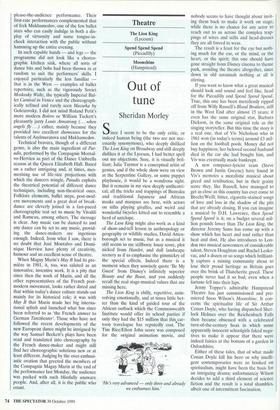Theatre
The Lion King (Lyceum) Spend Spend Spend (Piccadilly) Moonshine (Hampstead)
Out of tune
Sheridan Morley
Since I seem to be the only critic, or indeed human being (the two are not nec- essarily synonymous), who deeply disliked The Lion King on Broadway and still deeply dislikes it at the Lyceum, I had better spell out my objections. Sure, it is visually bril- liant; Julie Taymor is a conceptual artist of genius, and if the whole show were on view at the Serpentine Gallery, or some puppet playhouse, it would be a wondrous sight. But it remains in my view deeply untheatri- cal; all the tricks and trappings of Bunraku and traditional Japanese and African masks and masques are here, with actors on stilts playing giraffes, and weird and wonderful bicycles kitted out to resemble a herd of antelope.
The Lion King might also work as a kind of show-and-tell lesson in anthropology or geography or wildlife studies, David Atten- borough set to music, but as a musical it still seems to me stillborn: lousy score, plot nicked from Hamlet, and dull landscape scenery as if to emphasise the gimmickry of the special effects. Indeed there is a moment when they unwisely quote `Be My Guest' from Disney's infinitely superior Beauty and the Beast, and you suddenly recall the real stage-musical values that are missing here.
The Lion King is chilly, repetitive, unin- volving emotionally, and at times little bet- ter than the kind of guided tour of the African outback which the Commonwealth Institute would offer its school parties if only they had the $15 million that this.car- toon travelogue has reputedly cost. The Tim Rice/Elton John score was composed for the original animation movie, and 'He's very advanced — only three and already we embarrass him.' nobody seems to have thought about invit- ing them back to make it work on stage, while there is no chance for any actor to reach out to us across the complex trap- pings of wires and stilts and head-dresses they are all forced to wear.
The result is a feast for the eye but noth- ing much for the ear, or the mind, or the heart, or the spirit; this one should have gone straight from Disney cinema to theme park, avoiding the theatre altogether, since down in old savannah nothing at all is stirring.
If you want to know what a great musical should look and sound and feel like, head for the Piccadilly and Spend Spend Spend. True, this one has been mercilessly ripped off from Willy Russell's Blood Brothers, still in the West End after almost 15 years; it even has the same original star, Barbara Dickson, in the same original role as the singing storyteller. But this time the story is a real one, that of Viv Nicholson who in 1961 won (in today's terms) around £3 mil- lion on the football pools. Money did not buy happiness; her beloved second husband died in the car she had bought him, and Viv was eventually made bankrupt.
A new composer-lyricist team (Steve Brown and Justin Greene) have found in Viv's memoirs a moralistic musical about greed and retribution, but in their grainy score they, like Russell, have managed to get as close as this country has ever come to Brecht/Weill; bitter, cigarette-stained songs of love and loss in the shadow of the pits that are already closing. If you can imagine a musical by D.H. Lawrence, then Spend Spend Spend is it; on a budget several mil- lion pounds lower than The Lion King, the director Jeremy Sams has come up with a show which has heart and soul rather than heat and dust. He also introduces to Lon- don two musical newcomers of considerable talent, Steven Houghton and Rachel Lesko- vac, and a dozen or so songs which brilliant- ly capture a mining community about to lose their proud heritage as Britain goes over the brink of Thatcherite greed. These people never had it so bad, even when a fortune fell into their laps.
Jenny Topper's admirable Hampstead Theatre has just commissioned and pre- miered Snoo Wilson's Moonshine. It con- cerns the spiritualist life of Sir Arthur Conan Doyle, who having dispatched Sher- lock Holmes over the Reichenbach Falls then became obsessed with a celebrated turn-of-the-century hoax in which some apparently innocent schoolgirls faked nega- tives to make it appear that there were indeed fairies at the bottom of a garden in Oxfordshire.
Either of these tales, that of what made Conan Doyle kill his hero or why intelli- gent contemporaries were so hooked on spiritualism, might have been the basis for an intriguing drama; unfortunately Wilson decides to add a third element of science fiction and the result is a total shambles, albeit one of intermittent fascination.


























































































 Previous page
Previous page